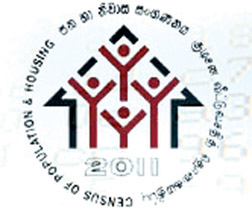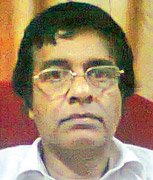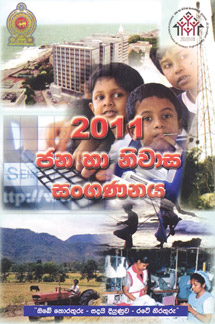|
 National Census from Feb 27 to March 21: National Census from Feb 27 to March 21:
Stand up and be counted
By Ranil WIJAYAPALA
For any country or nation a population census is a very important
event. It was considered a vital date for everybody as it is the
occasion where all the individuals are counted by the state officials.
Sri Lanka which has not undergone a complete census in 30 years is
ready to undergo this process at least in 2012 but with a different
approach with Census and Statistics Department fixing dates for the
enumeration stage sans a census night to complete the 2011 census in
March 2012.
The Census and Statistics Department has finally fixed the dates for
the enumeration stage of the 2011 census from February 27 to March 21 to
give a correct idea of the population and housing in Sri Lanka in its
post conflict scenario.
According to Director Census, of the Census and Statistics
Department, A.H.R. Gunasekara, although the third stage of the 2011 was
scheduled to be held last year, due to some delays in printing the
scheduled questionnaire used for the census it had to be postponed to
2012.
"Now we have fixed the dates and it will be conducted from February
27 to March 21", he added.
 |
|
A.H.R. Gunasekara |
Census are generally conducted in three stages and the first two
stages of the 2011 census were conducted in 2010 and 2011 respectively.
First stage
The first stage is allocated for the preparation of maps for the
census. In that stage the Census officials identify census blocks within
each Grama Niladari Division. "These are the smallest enumeration areas
which consist of 150 building units and we have demarcated them as
census blocks. This part of the census was conducted in 2010",
Gunasekara said.
At the second stage listing of building units were done based on the
maps prepared by the census officials. " We listed all the building
units in the enumeration areas and fixed a label and then enter
information into support form by providing house holders name and their
basic information. That is the basic frame for the enumeration stage. So
that stage was completed in April and May last year", he added.
"The third stage of the census, the enumeration stage was scheduled
to be held in 2011 but due to some delays in printing, the scheduled
questionnaire used for the census we had to delay it a little. Now we
have fixed the dates. It will be conducted from February 27 to March
21", he added.
The enumeration stage will also be conducted in various stages and a
huge number of enumerators, census officers, government officials in the
administration sector will be involved in this process.
" We are conducting the census according to the Census Ordinance and
according to it, District Secretaries are the Commissioners of Census in
that particular district and Divisional Secretaries are the Deputy
Commissioners of Census. The Assistant Divisional Secretaries are the
Assistant Commissioners of Census", he added.
"We are making use of the administrative structure at District level
in conducting the census and assigned the responsibilities to them to
carry out the census", he added.
In addition the branch offices of the Census and Statistics
Department at district level headed by Deputy Director or Senior
Statistician are providing the technical assistance to conduct the
census for Divisional Secretaries and other administrative officials.
"Our staff is basically the technical advisors who are providing the
technical guidelines for those who are participating in the census", he
added.
Enumeration stage
Apart from the Government officials, approximately 80,000 enumerators
have been recruited to conduct the enumeration stage of the census from
February 27 to March 22.
"Enumerators are the people who are going from house to house and
collecting information from the residents. They all will not be
government servants and there may be outsiders also. They all have been
selected by the Divisional Secretaries", he added.
Apart from the enumerators 16,000 supervisors have also been
appointed to supervise enumerators.
"Most of the supervisors are Grama Niladaris. We have 14,000 Grama
Niladaris but there are some areas Grama Niladaris are not available and
their positions are vacant. For those areas we have asked the Divisional
Secretaries to appoint some other responsible government officers to act
as supervisors", Gunasekara added..
The Census and Statistics Department will be training all the
enumerators to prepare themselves for the enumeration stages at
countrywide workshops.
 "We are training all the supervisors from January 12 to 18. We are
starting the training enumerators from January 19 and will be continued
till February 17. Therefore we will have more than 2,500 training
classes for the enumerators throughout the island. These will be
conducted by the Census Department officers at district level", he
added. "We are training all the supervisors from January 12 to 18. We are
starting the training enumerators from January 19 and will be continued
till February 17. Therefore we will have more than 2,500 training
classes for the enumerators throughout the island. These will be
conducted by the Census Department officers at district level", he
added.
Further explaining the qualifications of the enumerators who have
been recruited for this purpose, Gunasekara said the Department has
instructed the Divisional Secretaries to recruit Advance Level qualified
persons below 45 years of age for this purpose.
"We have not selected people at random. We have asked the Divisional
Secretaries to conduct interviews to select them. They should satisfy
certain criteria and their handwriting should also be tested as we are
going to scan the documents. Therefore we need good handwriting", he
added.
In areas where they do not get Advance level qualified people, they
have been asked to at least get Ordinary Level qualified people as
enumerators.
The enumeration stage will also be conducted in two stages, that is
data collection stage and revision round.
The three weeks from February 27 to March 19 will be the data
collection stage. During the data collection period enumerators will
visit each and every household and living quarter and collect
information from the individuals residing in the unit.
" We are asking 29 questions from persons and 17 details on the
household level", he added.
The informations that are to be asked at the enumeration stage from
individuals are listed under demographic information, migration
information, physical and mental difficulties, education information,
economic activities and the fertility information. Basically we are
collecting information on persons as well as on buildings.
Under demographic information the name, sex, marital status, ethnic
group, national identity card number, date of birth , religion and the
citizenship will be recorded from each person.
Migration information
Under migration information, the district of birth, duration of
residence in this district, district or previous residence, reason for
migrating to this district will recorded from each individual.
The physical and mental difficulties of persons will also be recorded
at the census.
Under education information, highest educational achievement, highest
professional or vocational qualification, and speaking, reading ,
writing ability of the individuals will be recorded.
Activities engaged in the past 12 months, main occupation and
industry, employed status and service, main non-economic activity in the
past 12 months will be recorded from each individual under economic
activities.
Fertility information of the females will also be recorded.
Information on housing will include, number of usual residents in the
household, principal source of drinking water, principal source of
cooking fuel, principal type lighting, toilet facilities / type of
toilet, principal method of solid waste disposal, tenure, existing
communication equipment , ability to access internet.
Under housing information number of households in the unit, number of
usual residents in the unit, principal material of construction of the
housing unit, wall, roof floor, type of structure, unit usage and number
of rooms will be recorded.
"We are asking the people to provide correct information to the
enumerators when they arrive at their houses at this enumeration stage",
Gunasekara added.
The revision round of the enumeration will be from March 20 and 21.
"In the revision round we review the data collected from February 27
to March 19 because there may be deaths and new births during that
period. We are deleting the records of the dead persons during the
revision round and the new births will be included", he said.
Apart from that the changes of residences will also be counted during
this revision period to make the data collected more accurate.
"We are asking these questions from the usual residence as we are
conducting this census based on the usual residence methodology but not
based on the de-facto methodology of counting people as they found that
was adopted in the previous census", Gunasekera added.
Basically, if a person is living somewhere for more than six months,
his usual place of residence is that place.
"If he is having two or more residences we select the place where he
mostly reside. For example if a person's home town is Galle and he works
in Colombo and used to visit home town once or twice his usual place of
residence is Colombo. But it will differ from his permanent residence.
That is the methodology used in many other countries as well",
Gunasekera added.
In addition to this, enumerators will also ask information about some
other people who have gone abroad for temporary reasons for more than
six months.
They are no longer a usual residence in Sri Lanka. Suppose they have
gone for middle East for two years we are asking information, their name
age, sex, the country and the purpose whether it is for work, education
or other purpose.
"Apart from collecting data from the usual residence we are also
collecting data from those who are not having homes to live. We are
counting them on the night of March 19. We already asked the District
officers to identify the places they can find the people living in
streets and appoint enumerators to collect data from them. They have
already identified them and they will counted on March 19 night", he
added.
At the 2001 census, in one night all the people were counted. At the
initial stage basic information were taken but on the census night all
were checked for the physical presence, that is because the last time
the methodology was not based on the usual residence, and the persons
were counted from the places where they were found on the census night.
"This time there is no such census night as we go by the usual
residents", Gunasekara added.
According to Director Gunasekara although Sri Lanka used the de-facto
method in earleir census that method is not so suitable for developing
country for planning purposes.
" In planning purposes they should give things for the people living
in the area whether it is transport, electricity . For the need
assessment we need the usual residence approach. For the district
administration purposes also they need the usual resident people. There
was request from the district level also for this", he added.
The second change in the 2011 census compared to the previous census
is the electronic capture of the documents.
"Last time we conducted it manually and data were entered through the
keyboards and it took over two years to enter the data collected from
the census. This time we want to expedite the matter and therefore we
are scanning the documents. It is not just scanning, the software we use
can take the data in that document into the data base. That is very
fast", Gunasekera added.
Apart from this, the Census and Statistics Department is also
planning to conduct electronic census in limited areas in the Colombo
Municipal Council area where large apartments are located.
"This time we are conducting it in a very small scale and about few
hundred houses we selected from apartment complexes in Colombo and
suburbs. We have visited them and got their consent. We will give them a
password into the system we have developed and they can log on to the
system and fill their forms online. That is on a testing basis. May be
on the next round of census we may further developed it", Gunasekara
added.
In many developed countries like Japan, Singapore, they are using
this e census.
According to Gunasekara the national ID number, reason for migration,
professional and vocational qualification, computer literacy are new
additions in the 2011 census.
"We are also asking the physical and mental disability like in the
previous census, but the approach will be different this time", he
added.
He said the entire census is funded by the Sri Lankan Government and
the total cost of the census is around 1700 million. " We also got
assistance from UNFPA, UNDP and UNICEF by means of equipment and
training the staff", he added.
According to Gunasekara through the Census Ordinance, citizens of
this country are bound to provide correct and accurate information to
enumerators. At the same time enumerators are also bound not to divulge
any individual information to anybody.
"They should give the correct information. That is from the part of
respondents. On the part of the census officials also they should not
divulge census information to anybody. If they divulged they are
subjected to certain punishments. At the same time, if somebody hides
information or give incorrect information there are provisions in the
Ordinance to fine them or imprison them. But we try to educate the
people rather than going for legal action", Gunasekara added.
Census Ordinance
Amendments were brought to the Census Ordinance to increase the fine
on those who are proved guilty of providing incorrect information to
enumerators. "If anybody breaches the Census Ordinance they can be
produced before Courts and be prosecuted. If somebody refuses to give
information or deliberately gives false information and if he is found
guilty, he or she can be imprisoned for six months and can be fined. The
fine has been increased to Rs. 50,000," he added.
"We are asking the support of the general public since they are the
ultimate beneficiaries of this census. We are asking them not to be
counted in two places and they have to be counted only in one place.
Everybody should be included in the census. Nobody should be missed out
or nobody should be duplicated", he added..
|

